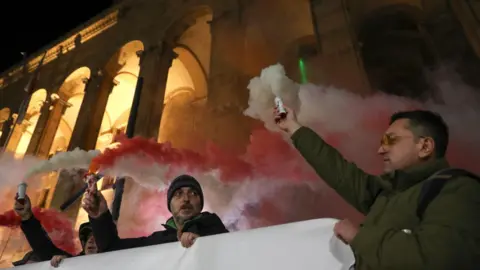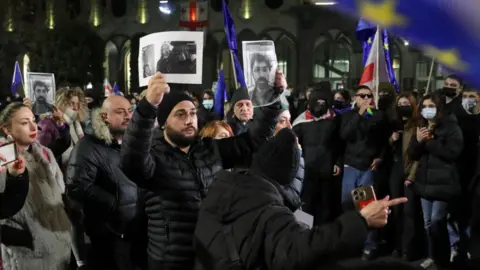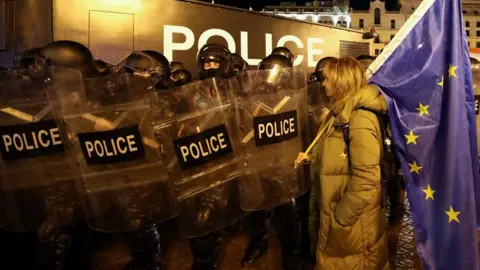Thousands took to the streets after the government suspended the EU bid

 Reuters
ReutersThousands of protesters returned to the streets of Tbilisi to protest the government’s decision to suspend accession talks with the European Union.
Demonstrators were seen shouting “traitors” and carrying pictures of journalists who they said were beaten by the police during Thursday night’s protests.
For the second night in a row, the police deployed tear gas and heavily used water cannons against the protesters.
Earlier, more than 100 politicians and civil servants in Georgia signed an open letter saying that the government’s decision is not in line with Georgia’s strategic interests.
Defending his decision, Prime Minister Irakli Kobakhidze accused the EU of “disloyalty” after EU lawmakers called for last month’s parliamentary elections in Georgia to be rerun. They cited “things going wrong”.
Since 2012, Georgia has been ruled by Georgian Dream, a group that critics say has tried to move the country out of the EU and closer to Russia.
The party claims to have won last month’s election, but opposition MPs are boycotting the new parliament, accusing it of fraud, and President Salome Zurabishvili has called the one-party parliament “unconstitutional”.
On Thursday, the European Parliament supported the decision describing the election as the latest stage in “a worsening democratic crisis” and saying the ruling party is “fully responsible”.
It expressed particular concern about reports of voter intimidation, vote buying and manipulation, and harassment of observers.
The European Parliament has also called for sanctions against the Prime Minister of Georgia and other senior officials including billionaire founder of the ruling party Bidzina Ivanishvili.
 Reuters
ReutersAfter this decision, the Prime Minister of Georgia said that his government “decided not to raise the issue of joining the European Union in the process until the end of 2028”.
He said Georgia will still seek EU membership but “with dignity” and on its own terms.
Kobakhidze also criticized European politicians for “throwing a lot of insults” at the Georgian government.
In response, thousands of EU protesters began demonstrating outside the Georgian Dream offices in the cities of Tbilisi and Kutaisi on Thursday.
Protesters see the government’s U-turn as a betrayal of the country’s aspirations. The principle of European integration is enshrined in the Georgian constitution.
Police began dispersing the rally at 02:00 local time on Friday (22:00 GMT Thursday), using batons, tear gas and water cannons after protesters blocked some streets in Tbilisi.
The protest lasted until 06:00 local time.
The Georgia Department of the Interior said protesters turned to trees several times, destroyed infrastructure and “seriously injured” 32 police officers.
The exact number of injured protesters is not yet known, but a member of the opposition Coalition for Change said one if its members, Nana Malashkhia, had their noses broken.
“During the anti-crime operation, we took shelter in a pharmacy, but the special forces raided behind us. If it wasn’t for the presence of the media, they would have beaten us to death,” Giorgi Butikashvili told the BBC.
Images on social media also showed a journalist from the opposition channel Formula TV being severely beaten by the police.
Some media representatives wearing clearly labeled media labels were also targeted.
On Friday, the EU representative in Georgia called the government shutdown sad and sad.
Pawel Herczynski said it is against the policy of previous governments and the wishes of the majority of people. Public polls have shown that more than 80% of Georgians see their country’s future as part of the European Union.
“Georgian Dream did not win the election. It overthrew the regime,” Shota Sabashvili, 20, told AFP.
“There is no parliament or legitimate government in Georgia. We will not allow this so-called prime minister to destroy our future in Europe.”
Ana, a student, said the Georgian Dream “is against the will of the Georgian people and wants to return us to the USSR”.
“That will not happen because the people of Georgia will never allow this to happen,” he told the Associated Press.
Uta, a protester, told the BBC that Georgians wanted a “better future” as part of the European Union.
“We don’t want to be part of Russia anymore”, he said.
Another protester, Vakho, said the government’s action was disappointing and did not represent “the will of the Georgian people”.
 AFP
AFPGeorgia has had official EU membership since 2023. However, Brussels had already suspended the entry process earlier this year. over Russian-style law targeting organizations accused of “pursuing foreign interests”.
Kobakhidze said that Georgia will continue to implement the reforms necessary for accession and that it still plans to join in 2030, but added that “it is important that the EU respects our national interests and traditional values”.
Former Georgian President Giorgi Margvelashvili told the BBC that the country is in a state of “unprecedented” change.
“Since we were independent 30 years ago, we obviously supported the West, we obviously supported Nato and we supported the EU and this included any government that was in place.”
But now, he added, there was an attempt “by a group of people who control the power in Tbilisi and the Kremlin to bring Georgia as quickly as possible into the orbit of Russia”.
Georgia’s ambassador to Bulgaria also resigned in protest. Otar Berdzenishvili said that he has been working for more than twenty years in promoting Georgia’s EU integration.
“Our tireless efforts must not be shaken or compromised under any circumstances. No, violence against the freedom of choice of peaceful protesters, full solidarity with them.”
Source link




